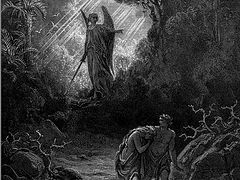We long for it without realizing that it is Paradise that our yearning is for. We are homeless without it, wanderers, waifs, orphans forever. Yet for some reason we still prefer wandering outside it. It attracts and engages us, yet no one can get to know it. Even Apostle Paul admitted: Eye hath not seen, nor ear heard, neither have entered into the heart of man, the things which God hath prepared for them that love Him (1 Cor. 2:9).
Nevertheless we are allowed to have a foretaste of it and, therefore, pine for it.
It is reflected in the pure, naïve smile of a child, happily smiling to his beloved mother with his toothless mouth. We can see a gleam of Paradise in sunrise colors, in a beautiful birdsong, in the play of countless shades of magnificent virgin nature. We feel it with all our hearts in a genuine, selfless love for our loved ones. Wherever we find a spark of a pure, innocent love we feel the breath of Paradise.
Paradise exists because God exists.
A paradise without God is hell full of earthly comforts, a decorated coffin with decaying dead flesh inside. Man without God is an orphan with eternal melancholy in his soul, with a vacuous mind and despair in his eyes. People have attempted to build this “paradise on earth” many times, but in vain, because they did it without the cornerstone.
The Bible—the revelation of God—begins and ends with Paradise as God carries forward to successful completion whatever He undertakes. And after the end of this world, God’s Paradise will be the Resurrection, Heaven, the Transfiguration of the world, and everlasting life with the Heavenly Father. I will give unto him that is athirst of the fountain of the water. He that overcometh shall inherit all things; and I will be his God, and he shall be My son (Rev. 21:6-7).
Of course, Paradise is not about the plenty in the Garden of Eden that we find in Genesis. It is about the fact that the Almighty blesses us abundantly with all good things. In Paradise our minds, hearts, and the innermost depths of our souls will be satiated with never-ending blessings, as the Creator Himself is everlasting.
Thus, Paradise exists because God exists. In fact God Himself is the highest good, joy, love, peace and life everlasting. Where there is light, there cannot be darkness at all. Where there is love, there cannot be any spite or hatred. Where there is God, there is the fullness of bliss, happiness, and all good and beautiful things.
Paradise exists not only because God exists but also because God is love (1 Cor. 4:8).
Let us imagine the following: If you love someone with all your heart, if he or she is the apple of your eye, don’t you wish this person supreme happiness, bliss, and goodness—that is, Paradise and the heavenly joys?
Paradise is an embrace of Divine love, the warmth of God’s care. In the Garden of Eden the first people were embraced by Divine love from all sides. It was like the closest bond and strongest attachment between children and their loving parent or between a loving couple. The primordial world created by God was nothing but the Divine embrace in which man, God’s workmanship, rested.
The cold heart melts in an embrace of love. And everything in the Garden of Eden breathed, was nurtured and warmed by Divine love. Hatred and coldness, evil and injustices appeared once people cut themselves off from the flow of this love. Paradise cannot live in a deceitful heart. To be more precise, a traitor’s heart leaves Paradise itself just as Judas left the company of Christ right during the heavenly sacrament of Eucharist, and this ultimately led to his downfall.
So, to put it simply, Paradise is life with God, a harmony between the creation and the Creator, a union of the soul with the grace of the Holy Spirit. He who is close to God is already in Paradise. This is the recipe for happiness! Paradise is the place where God reigns. Paradise won’t be opened to the soul until it is filled with humility, pure love, unselfishness, and faithfulness to the will of God rather than annoyance and resentment, spite and egotism. The Kingdom of God is within you (Lk. 17:21).
True, Apostle Paul admitted: …neither have entered into the heart of man, the things which God hath prepared for them that love Him (1 Cor. 2:9). But he added: But God hath revealed them unto us by His Spirit: for… we have received, not the spirit of the world, but the spirit which is of God; that we might know the things that are freely given to us of God (1 Cor. 10,12). In the words of the Apostle there is a desire to share the joys of what he contemplated rather than wistful regret or nostalgia for the unattainable. These words also contain a clue to the mystery of the opening of the doors of Paradise.
Firstly, God has already prepared Paradise. The Lord said, In my Father's house are many mansions (Jn. 14:2). Every blessing will be bestowed upon you by God in abundance. All that you need is to receive as much as you can.
Secondly, God has prepared Paradise for those who love Him. He has done it out of His infinite love, but how can we enter Paradise if we lack love? How can you dwell with Love if you are an embodiment of hatred, anger and indignation? Paradise is the place where God is present. And God is present where kindness, love and purity are in action.
Being aware of this, let us try and create our little Paradise while living here on earth. Not a “paradise” of technocracy, but a Paradise where the love for God, people and the whole creation reigns. If we do good for others, this life on earth becomes the beginning of Paradise. Good is opposed by evil, and a soul that is overcome by evil begins to suffer torments already in this life.
What is the difference between Paradise and hell? Hell is a soul that has retreated into itself, that is preoccupied with its own needs, problems and worries. This soul never invites anybody else into its life, while God stays out of this dark, bottomless slough of despond. Paradise is inhabited by the people who, like Christ, have sacrificial love, who serve others rather than withdraw into their shells. Genuine Paradise means being open to God and people—such are all the saints and all heavenly dwellers; if you are not like them, then heaven is not for you.
Paradise is the opposite of hostility. In Paradise there is no room for someone who is at enmity with somebody else. If you hate someone, feel malice towards him and don’t want to see him in Paradise, then how can you enter it with your embittered, spiteful soul?
When I was a boy, my grandfather would pull my ears and I held a grudge against him. When my grandad died, our peaceful life in the village came to an end. And now I want my grandfather to be in Paradise so much. If he is not in Paradise, That doesn’t do me any good. If I know that somebody is suffering, it will never comfort me. And if I were to be asked what I want the most, I would answer, “I want to see all my family, all my nearest and dearest in Paradise.”
Please, don’t judge me for this idea. Let us suppose that I end up in hell. But if I see all the people I feel great affection for in Paradise, it will make me so happy even in hell! It would be a boundless joy and delight to know that at least they have been saved. But in this case there would be no more hell for me, for my soul would be filled with joy because I will be so happy for people I love dearly. Hell disappears when we keep a sincere, pure love for others. In essence, hell is a cold stone of hatred and dislike. This ice is melted when the heart is warned up by love.
Paradise before the fall of Adam could be compared with pure and innocent childhood. All creatures are good and innocent as long as they are babies. Look at a little tiger cub or a lion cub! They are so lovely and innocent; they neither touch nor attack anybody; and they need their mothers’ protection and affection all the time. Once it was the same in Paradise: there even the biggest predators never hurt or did any harm to smaller animals—all the creatures were under the protection of the all-merciful Creator. In the original Garden of Eden everybody was pure and innocent; nobody was aware of temptation and that succumbing to temptation would lead to catastrophic consequences.
What is hell? It is when you feel terrible because of the sins you have committed and feel that it’s the last straw. Even if none of the people around you see you, you are eaten up with despair, frustration and guilt from inside; and if your soul leaves your body in this state, it will go to hell and will be burned by the fire of its sins. But Christ descended even in this hell as He Himself atoned for the sins of mankind.
God is love. How is this love demonstrated? The Savior descended to the nether regions to save us from eternal death and hell. Therefore, now Paradise is that of the people who were saved from hell, the Paradise of those who turned away from sin through repentance.
The first people in the Garden of Eden were unaware of the after-effects of the betrayal of God. Now people dwelling in Paradise have had an experience of anguish caused by their separation from God—so much the greater is their appreciation of the heavenly bliss just as sweet things are more appreciated after bitter things, a miraculous healing—after a fatal illness, the joy of resurrection—after death and decay.
Only a pure soul is able to receive a pure gift. You need to acquire the necessary traits to be admitted to Paradise. These are the qualities that Christ, the Master of Paradise, possesses. In this sense the Gospel is the door of Paradise—it is in the Gospel that we find the image of Christ, and Christ Himself teaches us which Christlike attributes we must develop in order to dwell with Him in Paradise.
God loves all that’s beautiful. The world that He created is very beautiful. He makes all things beautiful. Even the leaves that fall off in autumn are beautiful—they are golden yellow or fiery red. Therefore, man whom God created in His image and after His likeness loves only beautiful things.
Thus, we are pleased when simple worldly things are done beautifully and harmoniously. We like it when houses stand in proportion to each other and twinkle with peaceful lights from their windows in the evenings. We like it when the streets are decorated and no dirt is scattered all over sidewalks.
A simple old countrywoman who grows flowers in her yard tries to create a cozy, warm, beautiful atmosphere. Thus any worldly work that is carried out conscientiously and responsibly reflects our yearning for the harmony of the lost Paradise.
But not only is Paradise the beauty and harmony of the things around us—it is above all the Kingdom of Love. It is love that gives us this inner beauty and harmony.
If you succeed in building love and overcoming egotism in your family, if communion with God is the cornerstone of your family life, then you are creating your little Paradise (as the glimmer of Heavenly Paradise) in your little, cozy earthly home.
Let us pray for each other that all of us enter Paradise. Let us also pray for those who both love us and hate us, for those who know and who still don’t know God, who make efforts to lead a spiritual life and who have gone astray. God knows the best way to Paradise for every human being.
Can we really feel joy when somebody else has perished? The Lord created all humans for their salvation.
Let us wish heavenly bliss through communion with God even to our mortal enemies. Maybe then our hearts will finally begin to feel Paradise, too.





